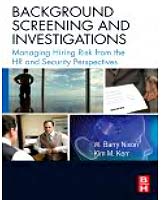Firm
pays $2M for bad hire
A
Lynnfield, MA investment firm is paying nearly $2 million to settle
charges of failing to supervise a broker who, after being arrested
on a charge of rape, allegedly admitted stealing $3 million from
clients. Secretary of the Commonwealth William Galvin announced
yesterday that Investors Capital Corp. agreed to cover $1.7 million
of client losses and pay a $250,000 fine for lax supervision of
Stephen Clifford. ``Whether you're Bernie Madoff or some guy from
around the corner, it doesn't matter,'' Galvin told the Herald.
``You need procedures in place to protect investors.'' Investors
Capital is settling allegations that it failed to properly supervise
Clifford or run adequate background checks before giving him a
job. Galvin claimed Investors Capital founder Theodore Charles,
a longtime Clifford friend, ordered the man hired even though
a credit check showed the suspect had some $442,000 in debts.
To read the full article go to:
http://www.istockanalyst.com/article/viewiStockNews/articleid/3246790

Veritas Capital Acquires Kroll Government Services, Inc.
Veritas
Capital, a leading private equity firm with a focus on companies
that provide services and products to the government market, announced
the acquisition of Kroll Government Services, Inc. from Kroll,
Inc., a subsidiary of Marsh & McLennan. In conjunction with
the transaction, Kroll Government Services, Inc. has been renamed
KeyPoint Government Solutions, Inc.
For
more information, please visit http://www.veritascapital.com

71%
of Young Workers Have Aspirations to Leave Job When Recession
Ends
Adecco
Group North America's latest American Workplace Insights Survey
finds the most serious threat to employers in this recession may
come at its end. The survey indicates every company's greatest
asset, its human capital, might be its most tenuous, as employers
could see an unprecedented exodus of talent when the job market
rebounds. The youngest age group of current professionals indicate
they plan to be knocking on the doors of their competitors with
(71%) of employed adults between the ages of 18 and 29 saying
they are at least somewhat likely to look for new jobs once the
upturn begins. “These findings should be an eye-opener for
employers who are so focused on cost containment that they are
losing focus on retention,” says Bernadette Kenny, chief
career officer of Adecco Group North America . “In good
times companies focus on how to keep their best and brightest
talent and this becomes more important in bad times. Younger Generation
Y employees bring a lot of new ideas and skills to the table,
they are a generation who likes to be challenged, and if they
lose this at their current job are not afraid to seek it elsewhere.”
For
More Information Click
Here
Offer
Rescinded After Background Check Discovers Felony Conviction:
Can Candidate Sue?
A candidate,
living in New Jersey at the time, was offered a job at Microsoft’s
headquarters in Redmond, WA. He received a written offer letter,
which stated his employment was at-will and the offer was conditional
on a successful background check. He also spoke with the hiring
manager, who encouraged him to quit his current job and begin
looking at houses in Washington. He recommended specific neighborhoods
and gave him the name of a real estate agent to contact. The candidate
quit his job and purchased a house. However, his criminal background
check uncovered a felony conviction, and he didn’t get the
job after all. He sued Microsoft, claiming the company asked him
to leave his employer and move across the country under the promise
of a new job. Who wins?
Cite:
Schley v. Microsoft Corp.
For more information
go to: http://www.hrmorning.com/best-of-hrrecruiting-offer-rescinded-after-background-check-
can-candidate-sue/

Leading
Senator Intends to Scrap E-Verify Employment Verification System
A
senator poised to lead the immigration reform debate on Capitol
Hill wants to scrap a government-run electronic employment verification
system and replace it with one that incorporates biometric identification.
Sen. Charles Schumer, D-New York and chairman of the Senate Judiciary
subcommittee on immigration, faulted the government system, known
as E-Verify, for not being able to detect identity fraud. “E-Verify
is both unfair and ineffective,” Schumer told reporters
on Capitol Hill on Thursday, June 25, prior to participating in
a White House meeting on immigration with President Barack Obama.
Schumer said that E-Verify, which compares information from I-9
forms against Social Security and Department of Homeland Security
databases, is unfair because it singles out people with Hispanic
surnames. It is ineffective because illegal workers can slip through
the system by stealing Social Security numbers and making fake
IDs. “You need a biometric,” Schumer said. “You
need a picture. You need it to be unforgeable.”
For
more information go to: http://www.workforce.com/section/00/article/26/50/94.php

Nevada:
Transmission Requires Encryption (Round 1 and 2)
On May 29,
2009, Nevada’s governor signed into law Senate
Bill 227 (pdf), which repeals NRS §597.970. Notably,
imposes a more rigorous encryption requirement and extends this
requirement to portable storage devices, just as Massachusetts
has done. Even more than its predecessor, the revised Nevada law
is an example of Data Security Regulation 2.0. Set to go into
effect on January 1, 2010, the new law provides that if a “data
collector doing business in this State” accepts payment
cards in connection with a sale of goods or services, it must
comply with the most current applicable Payment Card Industry
Data Security Standard (PCI DSS) with respect to those transactions.
PCI DSS, which requires the encryption of cardholder data when
transmitted wirelessly and in certain other circumstances, is
already a looming requirement for businesses that accept payment
cards; the revised Nevada law, however, codifies and enshrines
it. A “data collector” is any organization that “handles,
collects, disseminates or otherwise deals with nonpublic personal
information.” A data collector “to whom [the PCI DSS
clause] does not apply” (i.e., who collects, handles or
deals with personal informational in a context other than payment
card transactions) must encrypt personal information transmitted
electronically “through an electronic, nonvoice transmission
other than a facsimile” outside of the data collector’s
secure system. It must also encrypt personal information stored
on any device or medium (including any portable device or medium
such as a laptop, flash or USB drive, mobile phone, CD-ROM or
magnetic tape) that is moved “beyond the logical or physical
controls” of the data collector or its data storage vendor.
Encryption is now explicitly defined as requiring the use of cryptographic
keys to decipher data.
For More information
go to: http://www.revenews.com/andrewbaer/data-security-regulation-20-part-1-in-nevada-transmission-requires-encryption



Data
Security Regulation 2.0, Part 2: Massachusetts Has Written Your
Information Security Program
Massachusetts
Has Written Your Information Security Program. Unlike the Nevada
law (see
Part 1), which is relatively brief and narrowly focused on
the encryption of electronically transmitted data, Massachusetts’
new data security regulation, 201
CMR §17.00(pdf), is extremely sweeping and eliminates
much private discretion in the realm of information security by
imposing comprehensive, detailed operational requirements for
business activities that touch personal information. Issued by
the Office of Consumer Affairs and Business Regulation under authority
granted by the state’s identity theft law, the regulation
was initially set to go into effect on January 1, 2009. However,
complaints from business groups and the deflating economy convinced
the Commonwealth to postpone implementation and scale back some
of the more onerous requirements. The amended regulation was finalized
on February 12, 2009 and now mandates compliance by January 1,
2010. Despite some smoothing at the edges, it is still a remarkably
activist bit of policymaking. All philosophical and ideological
objections aside, 201 CMR §17.00 should be studied closely
by CIO’s and corporate counsel, not only to stay on the
Commonwealth’s good side, but also because the regulation
is basically a primer for writing an information security program
and may well provide a model for future federal data security
legislation.
For more information go to:
http://www.revenews.com/andrewbaer/data-security-regulation-20-part-2-massachusetts-has-written-your-information-security-program/

H.R.
427: Notify Americans Before Outsourcing Personal Information
Act
Ted
Poe, U.S. Representative, Texas’s 2nd District, 111th Congress
has sponsored bill H.R. 427 To prohibit the transfer of personal
information to any person or business outside the United States,
without notice. The congressional summary states the bill “Prohibits
a business from transferring personally identifiable information
of a U.S. citizen to any foreign affiliate or subcontractor in
another country without providing notice to such citizen that
the information may be transferred to such affiliate or subcontractor.
It authorizes a private cause of action in a state court to enforce
compliance with this Act.”
For
more information go to: http://www.govtrack.us/congress/bill.xpd?bill=h111-427

ClearStar.net
Launches Developer Community
ClearStar.net,
the leading technology provider for the employment and tenant
screening industry, announced today the launch of a new developer
community website at
http://developer.clearstar.net. Modeled after developer sites
for other popular web-based applications, this free online portal
will provide support for web and application developers writing
to ClearStar.net Gateway Web Services. Developers joining the
new online community will find easy access to always up-to-date
documentation, open source code and related developer toolsets,
forums for developer collaboration plus monitored Q&A. "The
developer site not only provides a place for us to publish the
most current documentation and provide easy access to code and
related toolsets but it provides a forum where independent developers
can share questions and concerns among themselves," explained
Ken Dawson, CIO of ClearStar.net. "Further, it establishes
an easy-to-use environment for providing feedback to and getting
answers directly from our development team." The site will
also include a marketplace where developers can showcase applications
they have developed using ClearStar.net Gateway Web Services to
other members of the community.
For more information,
please visit: www.ClearStar.net

USIS
Uses Lean Six Sigma To Produce Efficient, Timely, And Quality
Federal Investigations
A year ago,
USIS, the largest provider of security investigations to the federal
government, responded to a federal executive order to advance
policies to streamline the often lengthy background checks and
adjudications performed on federal employees and contractors who
need security clearances. USIS went to work on how to accommodate
a higher volume of investigations and adjudications in a shorter
timeframe—all while ensuring quality results and without
increasing costs. So far, USIS is outperforming the 2009 mandated
cycle times on three federal contracts. It has dramatically reduced
cycle time and increased productivity on current BI contracts
by implementing cutting-edge technologies and incorporating Lean
Six Sigma principles.
To read the
full article Click
Here

Christian
Security Network Supports Background Check Program Designed to
Help Churches Reduce Risks and Eliminate Potential Threats
The Christian
Security Network announced it has partnered with Safe Advantage
Services, a First Advantage Corp. company, in support of the Safe
Churches Project. The project was launched to educate churches
about the importance of background checks in minimizing legal
and financial risks. The Christian Security Network, a national
organization dedicated to the safety and security of churches,
endorses the Safe Churches Project as a “vital resource
for the Christian community.” When churches participate
in the Safe Churches Project, they are granted access to Safe
Advantage Services’ databases, which enable them to affordably
perform criminal and sex offender database searches, social security
traces, real county criminal record searches and national criminal
record searches. The company also handles dispute resolution on
behalf of churches at no additional charge in instances when criminals
challenge the accuracy of the information that is reported. The
Christian Security Network provides webinars, onsite security
seminars, risk assessment and consulting to Christian organizations
throughout the United States. The organization teaches churches,
ministries and schools that security starts within and that background
checks are the first line of defense against a number of crimes,
including child abuse, fraud and internal theft.
For more information
about the Safe Churches Project visit www.christiansecuritynetwork.org.

Hireright
Announces New Global Capabilities In Award-Winning Employment
Screening Application
HireRight,
a global leader in on-demand employment screening solutions, now
offers industry-leading international screening capabilities through
a single, on-demand screening management solution -- HireRight
Enterprise™, the industry’s first Web 2.0 screening
management solution, and winner of Human Resource Executive’s
Top HR Product of the Year Award in 2008. HireRight Enterprise
helps large employers address the complexities of employment screening
by providing a unified solution for managing a global screening
program--consistently, efficiently, effectively and conveniently--across
more than 200 countries and territories, worldwide, while delivering
a local experience for geographically distributed recruiters,
security personnel, and applicants or employees. “With differing
laws, regulations, norms, privacy concerns, and data and screening
requirements around the globe, expanding a screening program internationally
is quite a challenging endeavor,” said Lisa Gallagher, vice
president of international business, HireRight. “The new
enhancements to HireRight Enterprise make it easier for global
employers to implement and manage a consistent, yet highly localized
global screening program. . .HireRight Enterprise delivers a user
experience that program owners, global offices and applicants
will all appreciate.”
For more information
go to: http://www.hireright.com/pressreleasedetail.aspx?dpid=46

| Welcome
to the Legal Challenge Question! |
Sponsored By:
PreemploymentDirectory.com’s
2009 Marketing Portfolios for:
We
Specialize in Promoting the Products and Services of businesses
in the Background Screening Industry. Click on the specific Marketing
Portfolio above that fits your business.

As
the background screening industry continues to get more competitive
the firms that will ultimately succeed will be those that create
competitive advantage through their people by offering continuous
learning opportunities to heightened their knowledge and capabilities.
We believe that having employees that are very knowledgeable about
the legal landscape of background screening is essential to continued
success.
We are grateful
to Pam Devata, Seyfarth
Shaw LLP for providing the expertise for this valuable
endeavor. For information regarding the answers to the Legal Challenge
Questions, please contact Pamela Devata at Seyfarth Shaw LLP at
pdevata@seyfarth.com
or 312-460-5000 or visit www.seyfarth.com.
Please choose
your answer by clicking on it:



First
Advantage Partners with i3screen
Leveraging
cutting-edge technology to enhance drug testing delivery i3screen
announced that it has entered into a partnership with the Employer
Services segment of First Advantage Corporation to provide i3screen's
enhanced drug testing services to First Advantage customers, as
well as to provide i3screen customers with expanded services from
First Advantage's comprehensive platform of screening solutions.
As a result of the partnership, First Advantage customers will
have access to the most advanced substance abuse testing program
available.
For more information
go to: http://www.tmcnet.com/usubmit/-first-advantage-partners-with-i3screen-/2009/06/10/4219131.htm

| DATA
PROTECTION AND FRAUD |
Rotten
Apples: How To Detect And Stop Malicious Insiders In Your Organization
The most dangerous
– insider threat comes from the employee who knowingly breaks
security policy in order to achieve a selfish or malicious end.
There are
three main areas of deliberate insider threats:
- Theft for financial gain
- System or data sabotage, usually to “get revenge”
or gain attention
- Theft to gain a competitive advantage, sometimes called corporate
espionage
According
to Dawn Cappelli, senior member of the technical staff in CERT
at Carnegie Mellon University’s Software Engineering Institute
(SEI), many insider attacks have been linked to psychological
behavior which may indicate a predisposition toward overt acts
of violence or sabotage. Over 30 percent of CERT’s investigations
into insider threats have found that the person who committed
the attack had arrest records or some other history that might
have tipped off their future behavior. Where most employees will
temporarily grumble or become disenfranchisedwhen things don’t
go their way, many malicious insiders can’t get past their
anger. They continue to exhibit concerning behaviors, yelling
at co-workers, arriving late for work, or dropping in performance.
CERT found that these behavioral precursors were often overlooked
or ignored by management, leaving the attacker free to lay the
technical groundwork for attack.
For more information
go to: http://www.darkreading.com/insiderthreat/security/attacks/showArticle.jhtml?articleID=217600658

Employee
Awarded $583,413.00 for ConocoPhillips’“Willful”
Violation Of Oklahoma’s Workplace Drug and Alcohol Testing
Act
A federal
district court has found ConocoPhillips in “willful”
violation of the Oklahoma Standards for Workplace Drug and Alcohol
Testing Act (Okla. Stat. tit.40, §§551-565. (the Act).
A Jury then awarded the employee $583,413. Finding the company
in willful violation of the Act, the Court adopted the Oklahoma
Supreme Court’s definition of “willful” as used
in the Act as “not only conscious, purposeful violation
of the Testing Act, but also deliberate disregard of the law by
those who know, or should have known, of the requirements of the
Testing Act.” In state courtthe company was found in violation
of the Act for using a non-licensed test facility. Here, the issue
was the employer’s failure to provide the employee with
the required appeal procedures information in its policy.
For more information
go to: http://www.streckerlaborlaw.com/estesvconoco.jsp

The
Need to Know State Laws In Workplace Drug Testing
For the past
20 years the perception has been when conducting private workplace
drug and alcohol testing that the best thing to do was to follow
federal DOT rules. But, due to the many changes in state law “mirroring”
DOT rules in your non-regulated drug testing program can get you
into trouble. You must follow the rules that apply. A recent court
decision in Minnesota makes this abundantly clear. On November
5, 2008 a federal district court in Minnesota found in favor of
an employee who, despite having his first positive drug test and
contrary to state law, was fired. The Court appeared so upset
with those who fired him that the court took the rare step of
allowing the fired employee to amend his complaint to ask for
punitive damages.
For more information
go to: www.centerfordrugtestinformation.com



Court
Rules Privacy Trumps School District Right to Conduct Random Drug
and Alcohol Test
The North
Carolina Court of Appeals recently heard a case addressing a public
employer's right to conduct random drug and alcohol tests on its
employees. Graham County Board of Education’s policy mandated
the suspension of any employee who, in a supervisor's opinion,
was impaired by alcohol or drugs in the workplace. The boards
policy required all employees to submit to "drug or alcohol
testing" upon the policy's implementation and "suspicionless"
testing afterward. Susan Jones, a high- school teacher, filed
a complaint seeking to have the new policy declared a violation
of the North Carolina Constitution. The court considered whether
board employees have a reduced expectation of privacy by virtue
of their employment in a public school system. Public employees
may have reduced expectations of privacy if their employment carries
safety concerns for which the employees are heavily regulated.
Citing U.S. Supreme Court decisions and considering and balancing
all the circumstances, the court of appeals concluded that the
employees' acknowledged privacy interests outweigh the board's
interest in conducting random "suspicionless" testing.
It noted that there was no evidence in the record that explains
the safety concerns or that any board employee whose body contains
"a detectable amount of an illegal drug or of alcohol"
increases the risk of harm to anyone. Accordingly, the court held
that the policy violates Article I, Section 20's guarantee against
unreasonable searches and reversed the trial court's decision.
For more information
about Jones v Graham County Bd. of Education go to: http://www.aoc.state.nc.us/www/public/coa/dsheets/080477-1.htm

How
To Manage Key Client Marketing (the article was written
for Law firms, however, the key points are directly applicable
to firms in the background screening industry)
The bad news
is that most law firms are marketing to the wrong people. The
good news is that the solution is so simple that it was best stated
by my dentist: "Floss only those teeth you want to keep."
If the link between dentistry and marketing is not immediately
apparent, think of it this way: If you take care of what you have,
you can avoid painful, expensive replacement procedures. In many
law firms, 20 percent of the clients produce 80 percent of the
revenue. Yet those important clients typically receive a minuscule
portion of the firm's marketing attention. Client retention is
often regarded as something outside the boundaries of marketing
and as only a minor factor in compensation. But increased competition,
eroding client loyalty, "partnering" with clients, and
a slew of other factors have made that an increasingly suicidal
equation. Law firms seem compelled to focus their limited marketing
time and resources on where the money is not—making new
business pitches to prospective clients. To be sure, natural attrition
and other factors mandate that a firm keep looking for opportunities
with new clients. But it is far more important to retain current
clients. This is difficult for most firms to comprehend—that
is, until a major client defects or fades away. Why do firms lose
clients? Formal surveys point to how the client was treated by
various members of the firm—specifically, poor service or
neglect. Most well-established client relationships can sustain
a litigation loss or a matter that exceeded the client's perception
of cost, but not poor service in the form of missed client deadlines,
phone calls not returned promptly, and other acts of negligence.
Often, the loss of a client is due not to a single catastrophic
event, but to a cumulative series of "little murders"
committed by partners.
To read the
full article go to: http://www.ilw.com/articles/2009,0617-poll.shtm

Free
Pacer Dockets!
Paul Bush,
CEO, Courtport, LLC announced the launch of FreeCourtDockets.com,
which allows anyone to retrieve federal civil, criminal, and bankruptcy
court dockets, as well as dockets from the US Supreme Court, Court
of Claims, and Court of International Trade. Anyone with Internet
access can retrieve federal court dockets for free. No Pacer account
required, no credit card required, no charges, nada. All for free.
If you retrieve federal court dockets you no longer need to pay
"the duopoly" $5 per docket, or Pacer up to $2.40 per
docket. In today's economy, with shrinking budgets, you owe it
to your firm to reduce your research costs, and FreeCourtDockets
will help you accomplish this.
Access to
our new site is by invitation only. Request an invitation code
here, and
please mention you learned about the site from The
Background Buzz. Click
Here to Learn More



| RECORD
RETRIEVERS (continued) |
Tips
to Consider Before Placing an Order with a Record Retriever –
Tip #2
By Mike Sankey
Accurately
communicating needs and expectations goes a long way to avoid
major misunderstandings between clients and retrievers. Be clear
at the outset on what you expect a record retriever to do for
you. Here is tip # two of a search we think is essential to review
before you hire a retriever. Of course, the one big question not
on this list that you will want to ask the retriever is “What
is the cost?” This answer cannot be determined until the
ten items below are clear to both parties.
Tip# 2 Determine
Where You Want to Search.
Frequently this question is associated with the previous tip.
The point here is to simply make sure to ask if there is more
than one location where the information requested might be obtained.
Court locations provide a complex example in a number of states
and counties. A county may have two courts with the same jurisdictions,
but without a combined index to search. Or municipal courts in
a county may have overlapping jurisdiction for misdemeanors with
the state court in the county. You must determine if you wish
the retriever to search all or only part of the county court structure.
Another consideration is which county or parish to search. There
are over 8,000 ZIP Codes that cross county lines. You may wish
to independently check which county is correct for the given address
or ZIP Code of the subject. Is there an adjoining county with
a higher population that shares the same ZIP Code? This should
be determined before contacting the researcher. This article was
provided by the Public Record Retriever Network – PRRN
For More
Information Go To: www.prrn.us

| BOOK
REVIEW: SECURITY MANAGEMENT MAGAZINE |
Background
Screening and Investigations: Managing Hiring Risk from the HR
and Security Perspectives
By Barry Nixon, SPHR, and Kim Kerr, CPP; Reviewed by
Peter Psarouthakis
 |
Managing
risk in the hiring process can be a challenging task for
an organization’s human resources (HR) and security
departments. Having the right resources and experience to
properly conduct a background screening or an investigation
is vital. Fortunately, there is a growing amount of valuable
material available. Background Screening and
Investigations is one of them. Authors Barry
Nixon and Kim Kerr lay a good foundation by explaining the
risks posed by not having an appropriate screening process.
Next, they address how legal issues can affect background
screening and an organization as a whole. The authors then
explain how security and HR must collaborate in this important
process.
The chapter titled “Background Checking Policy”
is one of the book’s many highlights. Nixon and Kerr
explain the importance of having a policy in place and the
laws governing background screening. |
The usefulness
of this chapter cannot be overstated. The reader could easily
use the authors’ detailed arguments in making the case to
management that a policy is needed. Later, the chapter provides
detailed examples of hiring policies, focusing on specific issues
the documents must address. Other chapters in this book are just
as detailed and informative. Those who conduct background screening
or investigations know the importance of keeping current on the
ever-changing environment of background screening. Background
Screening and Investigations is an important resource
that anyone involved in hiring or the background screening business
should keep close at hand.
http://www.securitymanagement.com/article/background-screening-and-investigations-managing-hiring-risk-hr-and-security-perspectives-00
Reprinted
with permission of Security Management magazine. This is not intended
to be an endorsement by Security Management magazine or ASIS International.



One
Site! Many Suppliers! |
Looking for the Top Suppliers in the Industry? Need to find a
new Supplier?
Visit
PreemploymentDirectory.com’s VENDOR SHOWCASE
which features suppliers to the Background Screening Industry
(go to www.PreemploymentDirectory.com,
click on ‘Click Here’ and then scroll down to Vendor
Showcase for Background Screening Industry Suppliers)

STOP
STRUGGLING WITH WRITING AND PUBLISHING YOUR NEWSLETTER: |

We can help
you have a high quality e-newsletter to help nurture your relationship
with your clients and attract new clients. Our customized newsletter
service will take over your newsletter task or create a new one
for you. We can manage the creation of your newsletter for you.
We are constantly
researching information to use for The Background Buzz and
you can put our research to use for you. Using the information
rich content from The Background Buzz (minus the ads
and competitors information) we will create a custom newsletter
for you.
Use your staff’s
time to do more valuable work and save all the hassle of researching
or writing articles, formatting and managing all the other ezine
tasks with our customized ezine process.
Contact Barry
Nixon at 949-770-5264 or at wbnixon@aol.com
for more information.

NAPBS
International Committee Update
The NAPBS
International Committee has currently engaged the services of
a consultant that specializes in advising associations on how
to most effectively expand their organization internationally.
The consultant has been guiding us through the various options
for organizing and most effectively becoming an international
association. The consultant is currently developing a guidebook
for Chapters and Affiliates that will establish the frame work
for how the association will operate in the international arena.
She will be reaching out shortly to our International Members
for their comments and inputs on her draft document. Our target
is to have the guide book completed to present for final approval
at the upcoming Mid Year meeting.
If you would
like to participate on the International Committee or have any
questions please contact Bob Capwell at rcapwell@ebiinc.com
or Barry Nixon at wbnixon@aol.com

Asian
Market Power: The Next Step in Globalization
In early 2008,
when U.S. markets began to slide, but Asian markets held steady,
analysts worldwide asserted that western economies were decoupled
from those in emerging markets, namely China and India. The crisis,
it seemed one year ago, was a problem created by and for those
in the west. As 2008 ended and 2009 began, however, growth rates
in China and India, while still impressive, did not meet expectations.
Decoupling theorists, tails between their legs, rushed to offer
different explanations of the economic conditions, and while,
yes, Asia felt the pain of the recession caused by the west, they
are now emergent again, reaping the benefits of their own stimulus
plans, proving perhaps that the decouplists were on to something.
And now, as China and India lead Asia -- and the world -- into
recovery, it's fair to wonder if the next step in globalization
will be governed by a new set of economic rules that are not Euro-centric,
but instead devised in Beijing and Bombay. Organized in such a
framework, the potential for a new Asian economic order may alarm
many, but none of these trends should strike anyone as surprising.
While capitalism as our collective system of governance is here
to stay, the luxury of writing the rules is bound to shift with
the ownership of capital as it has over centuries, from Alexandria
to Rome, from Florence to London, and now from New York to China
and India. Western firms would be wise to acknowledge these slow
yet tectonic shifts and adjust their long-term global strategies
accordingly. Those failing to do so may not survive -- or they
may become acquisition targets.
For more information
go to: http://blogs.harvardbusiness.org/cs/2009/06/asian_market_power_the_next_st.html?cm_mmc=npv-_-WEEKLY_HOTLIST-_-JUN_2009-_-HOTLIST0625

Hard
Times Call For More Vigilance; Economic Downturns Promote An Increase
In Workplace Fraud By Company Employees
One of the
nastier effects of an economic crisis is a rise in white-collar
crime. So, if you think swiping an office pencil or nicking a
notepad is fine, think again. Petty theft may be commonplace,
but companies are not only entitled to view this as fraud, but
are more likely to do so when times are tough. The current financial
crisis points to an increase in white collar crime, according
to the January 2009 issue of the "Global Fraud Report"
by risk consultancy company, Kroll. Market downturns not only
traditionally reveal crimes which took place in former boom years,
but provide fresh opportunities for criminals and different vulnerabilities
for companies, the Kroll report said. Chinese respondents said
that 44 per cent of their security incidents were associated with
data theft, compared to 16 per cent worldwide. This year has also
seen a significant increase in reports of suspected theft and
corruption within Hong Kong companies with a presence on the mainland.
"Fraud is probably the number one non-operational factor
leading to business failure in our zone," said Steve Vickers,
FTI-International Risk's president and chief executive.
For more information
go to: http://www.kroll.com/library/fraud/FraudReport_English-US_Mar09.pdf

Despite
Slow Industry Growth, Economy Grew 6.7% In FY09 Against Estimate
Of 7.1%
Braving global
recessionary trends, India managed 6.7% economic growth in 2008-09
despite the manufacturing sector recording a dismal performance.
And a 5.8% growth rate during Q4 of the fiscal, at a time when
most developed economies have shrunk, puts India among the top-most
growing nations. The news was cheered by the stock market, which
saw an immediate rise in the Sensex by 400 points to touch 14,692.27
at the BSE by mid-day, a level last witnessed in September 2008.
Commenting on the figures released on Friday, Planning Commission
Deputy Chairman Montek Singh Ahluwalia said, “It is on expected
lines.”
For more information
go to: http://www.mumbaimirror.com/index.aspx?page=article&sec
tid=3&contentid=2009053020090530030937545c048e5f6



Is
Personal Data Safe At Firms?
Making
rules can be just as difficult as complying with them. Dutch researcher
Marieke Thijssen investigated how well the Personal Data Protection
Act (Dutch acronym Wbp) is harmonised with other rules that firms
must comply with. Her findings: sometimes it is very difficult
for firms to adhere to the rules of the Wbp. The Wbp contains
rules for firms that make use of personal data. For example, a
firm may only collect and process personal data if there is a
clear reason for this. However, in using personal data a firm
should not only comply with the rules of the Wbp; it must also
comply with the rules of company law and property law. Thijssen
established that the rules of the Wbp are not always in line with
those of company law and property law; the Wbp ignores the fact
that in practice the firm is not in a position to act. The firm
itself does not act, but natural persons on its behalf. The rules
of the Wbp do not always take this into account, but those of
company law and property law do.
For
more information go to: http://www.alphagalileo.org/ViewItem.aspx?ItemId=58846&CultureCode=en

UK
Business Losing the Fight Against Fraud
Over the last 6 years our FraudTrack
analysis has shown that UK businesses are losing the fight against
fraud. In just the last year, we have seen total fraud move up
to £1.19bn, up 14 per cent on 2007. We also know from our
experience that fraud is on the rise and it is clear to us that
the FraudTrack figures are only showing us the tip of the fraud
iceberg. We predict that the 2009 figures will be even worse particularly
as we head deeper into recession. This FraudTrack report is based
upon extensive research conducted throughout 2008 by BDO Stoy
Hayward along with comment and analysis from our team’s
investigative experience. Insightful findings included:
- 29% of fraud (£339m in 2007; £358m
in 2008) was perpetrated by managers;
- fraud in the finance and insurance sector increased
by 83% and accounted for 66% of all fraud in the UK in 2008
compared to 42% in 2007 and
- the retail sector has experienced a massive
increase of 674% increase from 2005 to 2008 in reported fraud.
To learn more
and how to fight fraud go to:
http://www.bdo.uk.com/services/advisory/forensic-accounting/fraud-investigations/fraudtrack.html

Council
Loses £1m Case Over Medical Questionnaire
Cheltenham Borough Council has lost what was labelled
by the judge as a “novel case,” believed to be the
first concerned with false statements on a CV or medical questionnaire.
The local authority had accused Christine Laird, its former Chief
Executive, of lying on the medical questionnaire she filled in
when she applied for the role. The council alleged that Laird
should have declared bouts of depression she had suffered before
taking up her role at the council. The specific questions referred
to were: “Do you normally enjoy good health?” and
“Do you have a mental impairment?,” to which Christine
Laird answered “yes” and “no” respectively.
Laird took up the role in 2002, but left three years later on
an ill health pension. The council says Christine Laird’s
health problems had cost in the region of £1m. She alleged
she was bullied at work. Dismissing both the council’s action
and Laird’s claim for damages, the judge said that the answers
she gave were not false nor, “given the terms of the questions
asked were they misleading,” and she did not have an impairment
under the Mental Health Act or the Disability Discrimination Act
1995.
Source: Workplace
Law Network Members' Bulletin 446, 6/18/2009 6:05:00. www.Workplacelaw.net

Capita CRB
Check Goes Online
Capita Recruitment
Vetting Services has introduced an online Criminal Records Bureau
(CRB) checking system. E-bulk, a web-based CRB disclosure management
system, allows an applicant’s data to be captured, processed,
checked and countersigned. Andrew Yarwood, marketing manager for
Capita Recruitment Vetting Service, says: “The new E-bulk
system promises to be faster, easier, more efficient, and with
no data errors. This is due to the fact that there is no need
for postal costs and a reduced administrative cost; it’s
also more secure with all application records being held in one
place. For employers and employees alike the new CRB check online
will mean a great deal less hassle.”
For More Information
Go To: http://www.capita.co.uk/media/Pages/CapitaputsCRBcheckonline.aspx

IT
Privacy Risks To Be Considered When Data Systems
According to The Information
Commissioner’s Office “For the public to have trust
in an organisation, individuals must be confident that their information
is held securely and processed in line with the Data Protection
Principles. Each time someone gives away their personal information
this not only puts the data at risk, they can leave a footprint
creating a detailed picture of aspects of their daily lives. Therefore,
it is essential that before introducing new systems and technologies,
which could accelerate the growth of a surveillance society, full
consideration is given to the impact on individuals and that safeguards
are in place to minimise intrusion.”
For more information
go to: http://www.workplacelaw.net/news/display/id/20782

|
ADVERTISERS IN THIS EDITION |


|
UPCOMING CONFERENCES & EVENTS |
2009
Events (Click
Here to View full list of 2009 Events) – Updated Monthly
SHRM
State Conferences, visit http://www.shrm.org/Conferences/StateAffilliateConferences/Pages/default.aspx
Drug
and Alcohol Testing Industry Association (DATIA), 2008 Training
Course Schedule, visit http://datia.org
 |
National
Association for Professional Background Screeners (NAPBS),
2009 Webinar Schedule, visit www.napbs.com |
World
Federation for Personnel Management, Events, http://www.wfpma.com
|
 Xin
chào
Xin
chào Follow
me on Twitter at
Follow
me on Twitter at 












